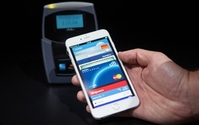
Mobile payment systems like Softcard, Apple Pay and Google Wallet may be slow to catch on in the United States, but they’re not to be written off, particularly as younger
generations become more powerful market forces.
According to GfK’s FutureBuy study, Millennials and the generation following them (Generation Z) are much more
likely to view mobile payment systems as faster, easier or more efficient than other types of transactions, even as they express some concerns about those systems’ security and privacy.
(Generation Y, whose members are approaching child-bearing age, are particularly concerned about personal information security via mobile payments.)
“It could grow. The
generation [members] under 35 get the potential benefits. The older ones are worried about security issues,” Tom Neri, executive vice president of GfK’s Financial Services team in North
America, tells Marketing Daily. “As people become more mature and have more to protect, they become more concerned about security.”
advertisement
advertisement
According to the survey,
Millennials and Generation Z over-indexed in perceptions of mobile payments as easier, faster and more efficient when compared with members of Generation X or Baby Boomers. In fact, about a third of
Generations Y and Z said mobile was their preferred mode of payment, whenever available. The issue, Neri points out, is the lack of availability and inconsistency of a common payment system.
“Right now, people are standing by. There’s a willingness to embrace mobile payment, but they’re standing back because they sense these issues,” Neri says.
Furthermore, 42% of all U.S. consumers agreed with statements that the technology is clunky and 37% agreed that mobile payments were gimmicky.
Apple’s introduction of
its ApplePay system, however, could be the spur the industry needs, thanks to the company’s trusted brand name. “No one’s really made the case yet, and Apple’s probably in the
best position to do so,” Neri says.
Still, the biggest hurdle to widespread adoption is security. More than half (57%) of all U.S. consumers were worried about their personal
information. However, among Generations Y and Z, about a third agreed (34% and 38%, respectively) with statements that mobile payments were more secure than typical transactions. (Comparatively, only
16% of Generation X and 12% of Baby Boomers felt the same way.)
For mobile payments to catch on, the industry will have to take steps to address those issues, Neri says.
“There’s a need for some messaging to address these concerns,” he says.